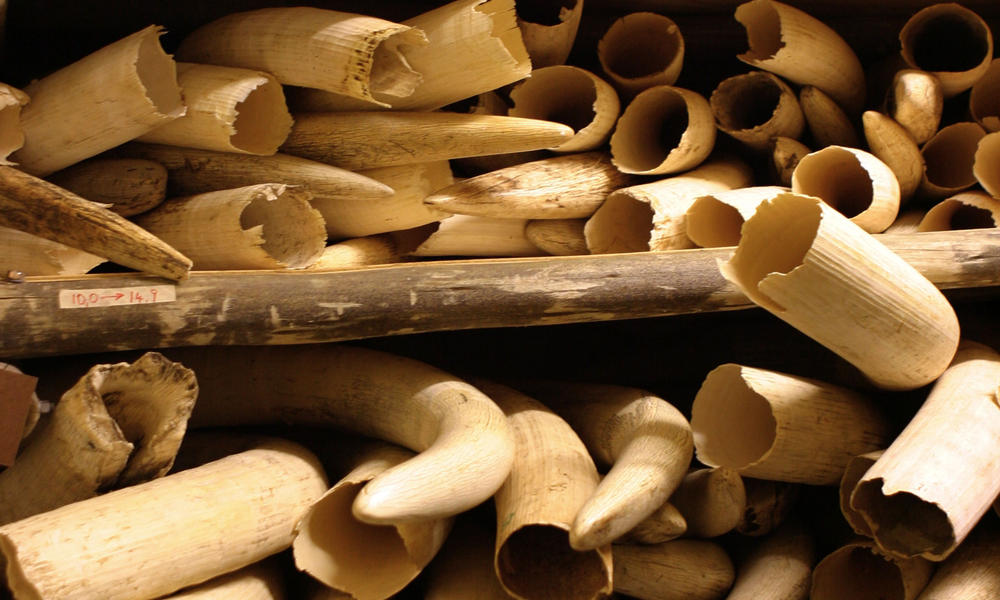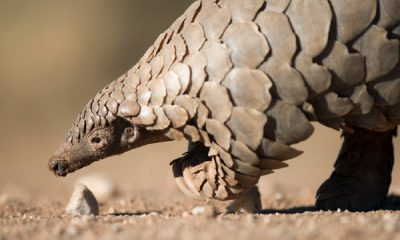General
Nigeria Customs Seizes N22bn Pangolin, Elephant Parts

By Adedapo Adesanya
The Nigeria Customs Service (NCS) has seized 196 sacks containing 7,137 kilogrammes of pangolin scales, 4.6 kg of pangolin claws and 846.34 kg of ivory after it busted a network of people who are involved in exporting prohibited animal products in Lagos.
The raid, carried out towards the end of July, the service said, was aided by the intelligence provided by the Wildlife Justice Commission.
All the wildlife products were destined for export, according to a statement released by the customs and the Wildlife Justice Commission.
Additional suspects are being sought in respect to this seizure, some of whom are believed to have already fled Nigeria.
This is the ninth largest seizure of pangolin scales in the last three years.
According to the statement, the arrested suspects are part of a well-known transnational criminal network operating in West Africa.
They are linked to approximately 50 per cent of all major pangolin scale seizures over the past three years.
“These arrests have severely disrupted this network,” the statement said.
The Comptroller-General of Customs, Mr Hameed Ibrahim Ali, said the seized contrabands were worth N22 billion.
Mr Ali said authorities had arrested the culprits – three foreign nationals and were pursuing a fourth, whom he described as the kingpin of the operation.
“The suspects arrested will soon have their date in court as NCS will leave no stone unturned to bring them to justice,” Mr Ali said.
“The Wildlife Justice Commission wishes to congratulate Nigeria Customs for their quick response resulting in this outstanding outcome against a well-established transnational organised crime network,” said Mr Steve Carmody, Wildlife Justice Commission Director of Programs in the statement.
“The truly horrific reality of this seizure is that even at seven tonnes, there were still eight other larger seizures in the last three years, and this network was responsible for at least half of them.
“We look forward to the arrest of the other wanted subjects and seeing proceeds of crime provisions applied to seize the ill-gotten gains of this network,” he added.
Large-scale and sustained trafficking of pangolin scales, sourced for jewellery and as a component of traditional Chinese medicine, is driving the species to the brink of extinction.
In 2020, Wildlife Justice Commission investigators were offered staggering quantities of pangolin scales, outnumbering the offers of ivory across all the organisation’s investigations for the first time.
This fact demonstrates the continued availability of pangolin scales and ongoing marketplace demand, despite COVID-19 travelling restrictions.
The Wildlife Justice Commission also identified that wildlife traders were stockpiling their products in order to resume trade as soon as restrictions were eased, a concern that has now been justified by seizures of massive amounts of pangolin scales such as this one.
The Wildlife Justice Commission had pointed out in recent reports that pangolin scales are increasingly substituted for, and trafficked alongside, ivory, a trend that the organisation already identified in 2019.
As ivory prices fall, traffickers are increasingly turning to pangolin scales; in combined shipments, the proportion of pangolin scales has surpassed the volume of ivory.
“This operation is a great example of how transnational wildlife crimes should be investigated and the tangible results that public-private partnerships can achieve by working together to disrupt organised crime,” said Mr Carmody.
“This operation is a major victory for law enforcement and for the Wildlife Justice Commission, but we must acknowledge that other actors will rise to take the place of those recently arrested.
“The Wildlife Justice Commission will use the evidence gathered through this arrest to continue our investigations into the trafficking of endangered wildlife and support the efforts of law enforcement agencies fighting wildlife crime. It takes a network to defeat a network.”
General
Nigerian Bottling Company Bridges Education, Employability Gap

By Modupe Gbadeyanka
The Nigerian Bottling Company (NBC) has reaffirmed its determination to bridge the gap between education and employability in the country by sustaining its flagship Youth Empowered (YE) programme.
This initiative provides hands-on learning, real-world insights, and access to career-shaping opportunities to young Nigerians.
The 2026 edition of the scheme commenced on February 2 at the University of Lagos (UNILAG), with participants mainly young people between the ages of 16 and 35.
A statement from the organisation said this year’s rollout will expand to more tertiary institutions, including the Federal University of Technology, Akure (FUTA). This follows a successful 2025 tour that reached seven cities across the country, including Makurdi, Jos, Benin, Kaduna, Asaba, Akure, and Port Harcourt.
Participants in the 2026 programme will receive training across key modules designed to support personal, professional, and business growth, including Business Life Skills, Adaptability and Resilience, Financial Literacy, Customer Service and Communication, Sales and Negotiation Skills, and Workplace Ethics.
The sessions will also feature breakout workshops on Business Planning, Project Management, and Time Management, alongside the Director’s Grant Pitch Competition, where participants can pitch their ideas for a chance to win business funding.
In addition to skills development, NBC’s People and Culture team will be present throughout the programme to identify outstanding talent for future opportunities within the organisation, further strengthening the connection between learning, employment, and long-term career growth.
One of the participants at the UNILAG training, Waliat Adedogun, who received a cash grant through the Director’s Grant Pitch Competition to support her small business, said: “Youth Empowered gave me more than training; it gave me clarity and confidence. Winning the grant means I can finally take my business idea from a dream into something real. I now feel prepared to build, grow, and create opportunities not just for myself, but for others too.”
Since its launch in 2017, the scheme has impacted more than 70,000 young Nigerians, equipping participants with practical skills, confidence, and exposure needed to succeed in today’s dynamic workplace and entrepreneurial landscape.
This year’s programme is being delivered in collaboration with Fate Foundation as the implementing partner, with funding support from The Coca-Cola HBC Foundation.
Last year, 10 beneficiaries were selected for six-month paid internships across NBC locations in Lagos, Ibadan, Asejire, and Challawa, gaining direct industry exposure.
Additionally, three outstanding participants received sponsorship for an all-expenses-paid intensive culinary training programme and were awarded N1 million each to support the launch of their businesses.
General
INEC Fixes February 20 for 2027 Presidential, NASS Elections

By Modupe Gbadeyanka
The 2027 presidential and National Assembly elections will take place on Saturday, February 20, the Independent National Electoral Commission (INEC) has revealed.
In a notice for the 2027 general polls issued on Friday, the electoral umpire also disclosed that the governorship and state assembly elections for next year would be on Saturday, March 6.
Speaking at a news briefing in Abuja today, the chairman of INEC, Mr Joash Amupitan, expressed the readiness of the commission to conduct the polls next year, which is 12 months away.
The timetable issued by the organisation for the polls comes when the federal parliament has yet to transmit the amended electoral bill to President Bola Tinubu for assent.
This week, the Senate passed the electoral bill, reducing the notice of elections from 360 days to 180 days, while the transmission of results was mandated with a proviso.
Recall that on February 4, INEC said it was ready to go ahead with preparations for the elections despite the delay in the passage of the amended electoral law of 2022.
General
NGIC Pipeline Network to Experience 4-Day Gas Supply Shortage

By Modupe Gbadeyanka
The pipeline network of the NNPC Gas Infrastructure Company Limited (NGIC) will witness a temporary reduction in gas supply for four days.
This information was revealed by the Chief Corporate Communications Officer of the Nigerian National Petroleum Company (NNPC) Limited, Mr Andy Odeh, in a statement on Thursday night.
A key supplier of gas into the NGIC pipeline network is Seplat Energy Plc, a joint venture partner of the state-owned oil agency.
It was disclosed that the facility would undergo routine maintenance from Thursday. February 12 to Sunday, February 15, 2026.
The NNPC stated that, “This planned activity forms part of standard industry safety and asset integrity protocols designed to ensure the continued reliability, efficiency, and safe operation of critical gas infrastructure.”
“Periodic maintenance of this nature is essential to sustain optimal system performance, strengthen operational resilience, and minimise the risk of unplanned outages,” it added.
“During the four-day maintenance period, there will be a temporary reduction in gas supply into the NGIC pipeline network. As a result, some power generation companies reliant on this supply may experience reduced gas availability, which could modestly impact electricity generation levels within the timeframe.
“NNPC Ltd and Seplat Energy are working closely to ensure that the maintenance is executed safely and completed as scheduled. In parallel, NNPC Gas Marketing Limited (NGML) is engaging alternative gas suppliers to mitigate anticipated supply gaps and maintain stability across the network,” the statement further said.
“Upon completion of the maintenance exercise, full gas supply into the NGIC system is expected to resume promptly, enabling affected power generation companies to return to normal operations,” it concluded.
-

 Feature/OPED6 years ago
Feature/OPED6 years agoDavos was Different this year
-
Travel/Tourism10 years ago
Lagos Seals Western Lodge Hotel In Ikorodu
-

 Showbiz3 years ago
Showbiz3 years agoEstranged Lover Releases Videos of Empress Njamah Bathing
-

 Banking8 years ago
Banking8 years agoSort Codes of GTBank Branches in Nigeria
-

 Economy3 years ago
Economy3 years agoSubsidy Removal: CNG at N130 Per Litre Cheaper Than Petrol—IPMAN
-

 Banking3 years ago
Banking3 years agoSort Codes of UBA Branches in Nigeria
-

 Banking3 years ago
Banking3 years agoFirst Bank Announces Planned Downtime
-

 Sports3 years ago
Sports3 years agoHighest Paid Nigerian Footballer – How Much Do Nigerian Footballers Earn













